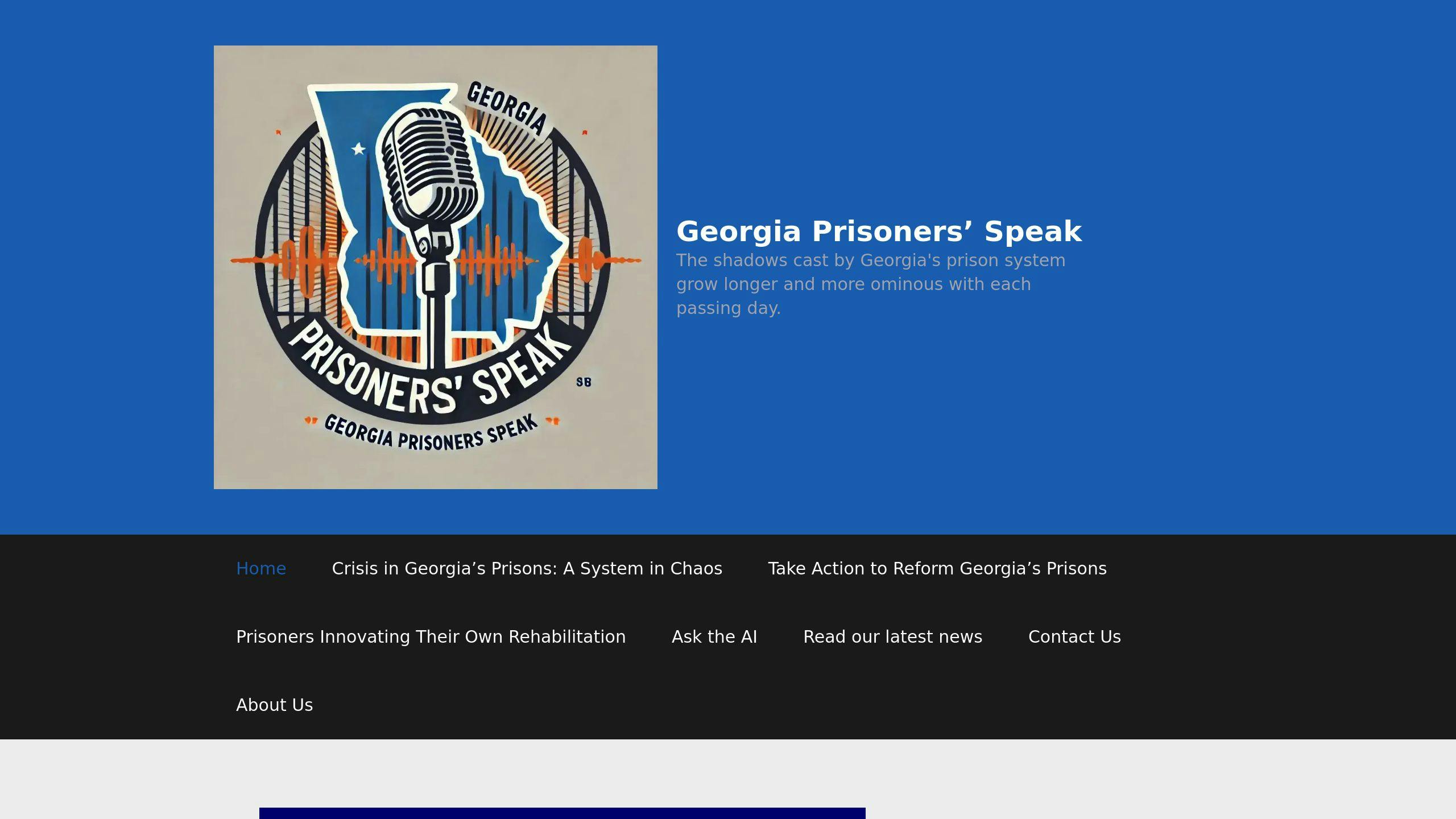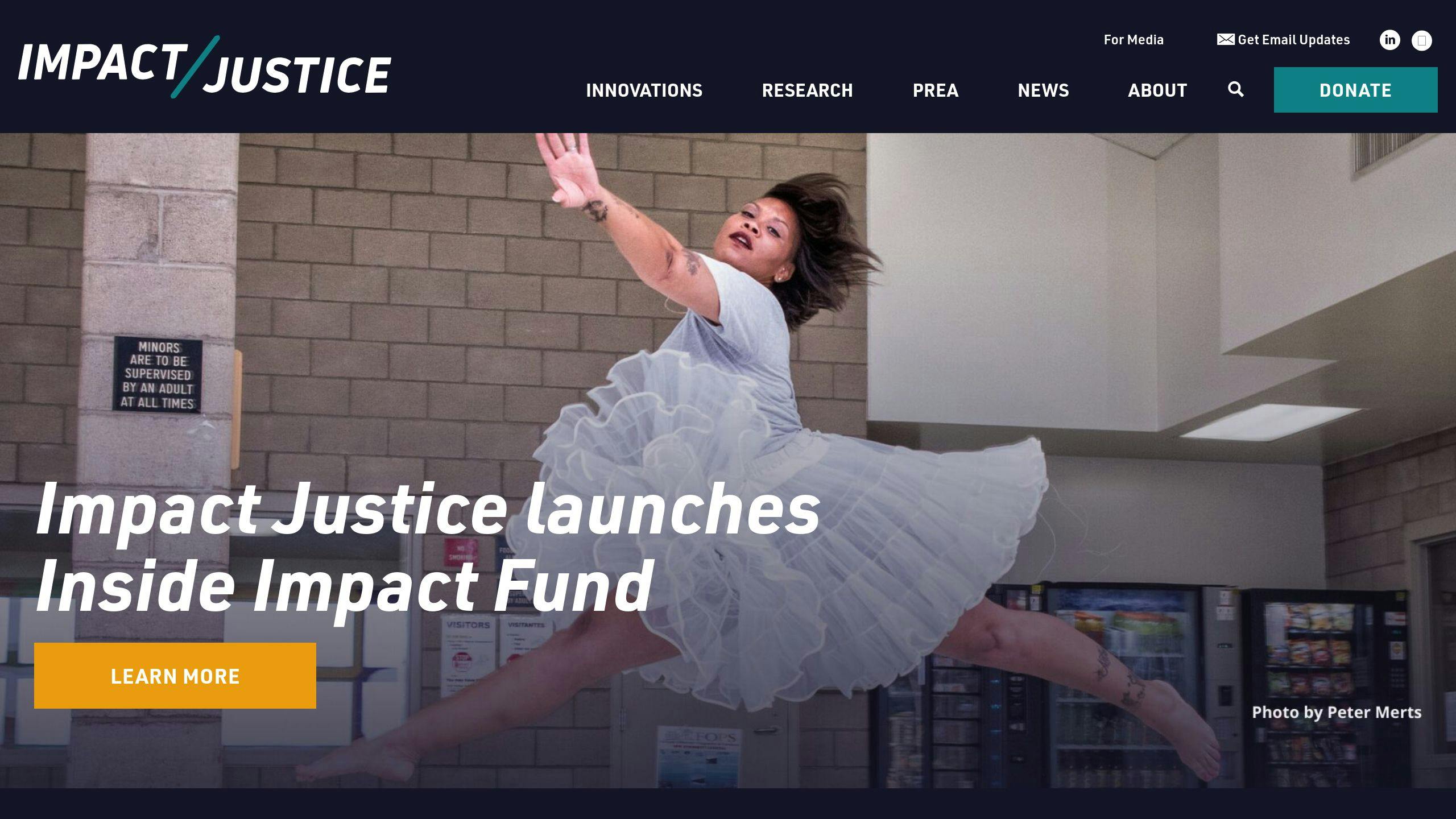Georgia’s prison system faces urgent challenges like overcrowding, poor conditions, and corruption. Advocacy groups and technology are working together to push for meaningful reform. Here’s what you need to know:
- Grassroots Efforts: Georgia Prisoners’ Speak (GPS) filed over 120 grievances in 2020, improving food conditions in prisons.
- Tech Solutions: Platforms like ImpactJustice AI use data to identify problems and support policy changes.
- Collaboration: Combining inmate perspectives with data-driven insights strengthens reform efforts.
This mix of grassroots advocacy and tech-driven tools offers a promising path for change in Georgia’s prisons.
DOJ finds Georgia prison conditions ‘out of control’ and ‘unconstitutional’
1. Georgia Prisoners’ Speak: Advocacy and Awareness

Georgia Prisoners’ Speak (GPS) is making waves by shedding light on the conditions inside Georgia’s prisons. Through grassroots efforts and tech-driven initiatives, they’re pushing for meaningful reform.
Driving Change Through Organized Action
In 2020, GPS spearheaded a grievance campaign to tackle severe food shortages. Over 120 grievances were filed, resulting in noticeable improvements in prison conditions [2].
A Multi-Faceted Approach to Advocacy
GPS utilizes several strategies to address issues and advocate for change:
| Advocacy Channel | Purpose | Impact |
|---|---|---|
| Weekly Updates | Track prison conditions | Ensures ongoing oversight |
| Legal Support Network | Connect inmates with lawyers | Facilitates legal interventions |
| Media Engagement | Counter official narratives | Assists federal investigations |
| Stakeholder Collaboration | Build reform alliances | Strengthens partnerships with other advocacy groups |
Insights from Experts on GPS’s Role
"GPS has been a critical part of the prison abolitionist movement in Georgia, providing an essential counter-narrative to the rhetoric coming out of the Georgia Department of Corrections." – Emily Shelton, co-founder of Ignite Justice [2]
GPS also works with journalists and policymakers, including Josh McLaurin and Jon Ossoff, to advocate for systemic reforms.
Balancing Exposure and Safety
While exposing institutional failures, GPS prioritizes the safety of prisoners. BT, the group’s spokesperson, underscores their mission:
"We stand committed as a movement against the use of strategic indifference, which is no sound policy to quell public fear of crime nor create rehabilitative conditions." [2]
Although GPS focuses on grassroots efforts, tools like ImpactJustice AI are helping to amplify reform initiatives through technology.
sbb-itb-7858f51
2. ImpactJustice AI: Technology for Advocacy

Grassroots movements like GPS amplify inmate voices, but platforms such as ImpactJustice AI take advocacy to another level by using data to back their efforts. This technology simplifies prison data, uncovers systemic issues, and supports evidence-based discussions with policymakers and the public.
Tools and Applications
ImpactJustice AI equips advocates with tools for data analysis, visualizations, and ready-to-use policy templates. These features help identify biases, make better decisions about resource allocation, and measure the effectiveness of reforms. For example, data-driven educational programs created through the platform have been shown to lower recidivism rates, showcasing its role in shaping impactful reform strategies.
Privacy and Implementation
The platform prioritizes ethical data practices through regular audits, strict privacy measures, and input from the community. During the Council on Criminal Justice‘s June 2024 meeting, experts discussed how these tools can integrate seamlessly into advocacy work, stressing the importance of transparency and accountability alongside traditional approaches.
Strengths and Weaknesses of Advocacy Tools
Modern efforts in prison reform rely on a mix of grassroots movements and tech-based solutions. Knowing the strengths and limitations of these tools helps advocates select the best approach for their goals.
| Tool/Platform | Key Strengths | Notable Limitations | Real-World Impact |
|---|---|---|---|
| Georgia Prisoners’ Speak (GPS) | – Provides firsthand inmate accounts – Organizes grievances effectively – Strong use of social media and PR – Operates underground education networks | – Members risk retaliation – Limited reach through underground methods – Heavy reliance on anonymous sources – Faces resource challenges | Filed over 120 grievances in 2020, leading to better food conditions |
| ImpactJustice AI | – Supports decisions with data – Automates analysis – Offers visualization tools | – Requires technical know-how – Needs frequent updates – Relies on accurate input and user expertise – Limited by access issues | Helped design educational programs that reduced recidivism rates |
These tools are often most effective when used together. For example, GPS’s grassroots efforts gain credibility when paired with the data insights from ImpactJustice AI.
Complementary Strengths
GPS shines in amplifying inmate voices and driving direct action, while ImpactJustice AI provides the data needed to back policy arguments. During the Council on Criminal Justice’s June 2024 meeting, experts highlighted how these tools work together: GPS offers critical inmate perspectives, which can guide the data focus of ImpactJustice AI.
Implementation Challenges
Each platform has its hurdles. GPS must navigate the balance between visibility and member safety, while ImpactJustice AI depends on reliable data and user expertise. These challenges call for new, collaborative strategies that blend grassroots efforts with tech-driven solutions.
Future Integration
The move toward combining these tools offers potential for addressing prison reform in Georgia. By pairing GPS’s qualitative insights with ImpactJustice AI’s detailed analysis, advocates can make stronger cases for policy change. Emily Shelton, co-founder of Ignite Justice, underscores GPS’s role in Georgia’s reform efforts [2], especially in a state with one of the highest per-capita correctional control rates [1].
Conclusion
Merging grassroots advocacy with modern tools offers a strong path for addressing prison reform in Georgia. The efforts of GPS, focused on direct advocacy, combined with the data analysis provided by ImpactJustice AI, show how different methods can work together to drive change.
Georgia has the highest rate of correctional control per capita in the U.S. [1], highlighting the urgency for change. For instance, GPS’s 2020 grievance campaign successfully improved prison food conditions, showcasing the power of organized efforts [2]. When these efforts are supported by the analytical strength of ImpactJustice AI, they gain more weight in influencing policy and public opinion.
Bringing together GPS’s community-driven work and the data insights from ImpactJustice AI creates a well-rounded strategy for reform. This approach allows advocates to combine personal stories with solid data, making their arguments both relatable and backed by evidence.
Real progress requires collaboration between advocacy groups, tech platforms, lawmakers, and the community. By working together, Georgia can tackle its correctional challenges and move toward a fairer and more humane prison system.
